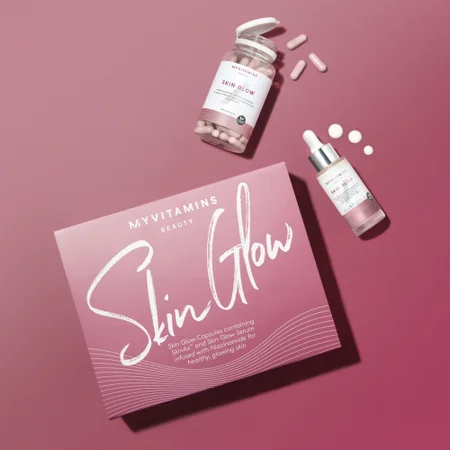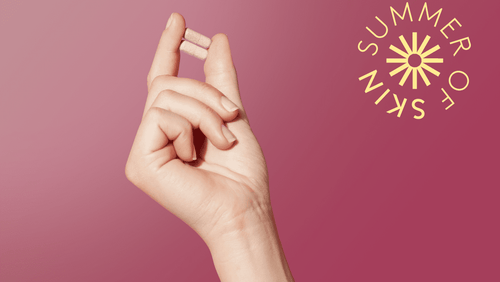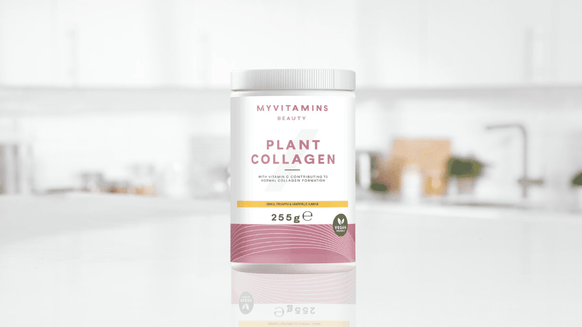Can Stress Cause Skin Problems? | Summer Skin School

Have you ever noticed a breakout before a big event, or a flare-up during a stressful week? Our skin, the body’s largest organ, can provide us with clues that our bodies may be under stress.
So, understanding how stress affects your skin may be an important step towards managing some skin conditions.
Let's explore the connection between stress and skin health and look at ways to keep your skin supported during stressful times.
- Can stress cause skin problems?
- How does stress affect skin health?
- Ways to manage stress and skin problems
- FAQs

Can stress cause skin problems?
Your skin is not just a protective barrier; it’s also a sensory organ that sends signals to your brain. For example, a soothing touch or a gentle massage can help reduce stress and improve your mood.
On the flip side, high stress levels or emotional turmoil may show up as skin issues like acne, or eczema. This relationship highlights how closely linked our skin health is to our mental and emotional well-being and current research suggests that stress may be associated with a range of skin problems (7).
The body of evidence suggesting an association between stress and skin problems is well documented and growing. Although, a lot of research in this area is observational, meaning that it does not automatically prove that one causes the other,
One study looked at whether a higher amount of psychological stress was linked to a greater number of reported skin conditions in medical students. It found that highly stressed medical students had more skin conditions such as flaky scalps and itchy skin that the students who were less stressed (4).
In another study the level of stress was linked to acne severity (16).
It's important to remember that this can work the other way around too. Skin conditions can go on to increase stress and emotional wellbeing due to their visibility or discomfort and further compound the problem. This can lead to a vicious cycle where stress leads to skin problems which then creates more stress and so on, making it hard to break the pattern.

How does stress affect skin health?
So how does this link between stress and our skin work? When the body experiences stress, it triggers a cascade of hormonal responses through the sympathetic nervous system (SNS) and the hypothalamic-pituitary-adrenal (HPA) axis, which causes a rise in stress hormones including cortisol.
While these hormones are mean to be useful during stressful times, they can have negative effects on the skin such as increasing inflammation, affecting wound healing and the skin barrier function, increasing oil production and suppressing immunity, through what has been coined the brain-skin axis (3).
This may then lead to skin problems or trigger existing conditions.
Interestingly, it’s not just how we feel that can influence our skin, as our skin also responds to stressors through its own localised stress response (7).
This means that environmental (not just psychological) stressors such as air pollution and exposure to ultraviolet radiation and blue and red light may also affect our skin health (13).
Stress can also prompt us to engage in behaviours that can worsen skin problems. Think about it: when we’re stressed, many of us tend to scratch or pick at our skin which can increase problems with our skin further.

Ways to manage stress and skin problems
If you are feeling overwhelmed by stress and battling skin issues, then these strategies can help you to manage these and restore your well-being.
1. Exercise regularly
Engaging in physical activity can help reduce stress hormones and increase endorphins, thereby supporting our skin health.
2. Eat a balanced diet
Consuming a balanced diet rich in fruits, vegetables, lean proteins, and healthy fats can nourish your skin from the inside out.
3. Stay hydrated
Drinking plenty of water helps keep your skin hydrated.
4. Prioritize sleep
Getting enough sleep is crucial for skin regeneration and reducing stress. Establishing a relaxing bedtime routine can also help with achieving your 7-9 hours of quality sleep each night.
5. Have a consistent skincare routine
Establish a consistent skincare regimen with products suitable for your skin type. Products with active ingredients like hyaluronic acid and niacinamide may offer an extra boost.
6. Practice mindfulness and relaxation
Incorporate practices like meditation, yoga, or deep breathing exercises to manage your stress levels effectively and support your skin health.
7. Talk to a professional
If stress and skin problems persist, consider consulting a doctor, dermatologist or a mental health professional for tailored advice and treatment options.
8. Stay connected
Maintaining social connections and talking to friends or family can provide emotional support and help reduce stress.

Talk To Your Doctor
Don’t forget when considering new supplements, it’s essential to talk to your doctor first. Myvitamins isn't making any medical claims in this article. Your healthcare provider can offer the best guidance based on your individual health needs and conditions. Always seek professional medical advice before making any changes.
Take Home Message
Managing stress isn’t just about feeling better mentally, it may also improve your skin’s health. Stress may have a major impact on our skin through changes in hormones and increased inflammation.
By incorporating regular exercise, practicing mindfulness, and following a healthy lifestyle, you can help to reduce stress and support clearer, more vibrant skin.
Check out the rest of Myvitamins Summer Skin School articles for more expert explainers:
FAQs
What does stressed skin look like?
Stressed skin can appear dull, and tired, losing its natural glow and vibrancy. It can be more prone to breakouts, redness, and irritation due to increased oil production and inflammation. It can also feel dry and itchy, sometimes leading to conditions like eczema or psoriasis flaring up.
What are common skin-related conditions related to stress?
- Acne: Stress increases the production of hormones like cortisol, which may lead to an increase in oil production and, consequently, acne breakouts.
- Eczema: Also known as atopic dermatitis, stress may cause flare-ups of this condition, leading to red, itchy, and inflamed patches of skin.
- Psoriasis: Stress may worsen psoriasis, an autoimmune condition that results in red, scaly patches on the skin.
- Rosacea: Stress may aggravate rosacea, causing increased redness and swelling.
- Hives: Also known as urticaria, stress may lead to the development of hives, which are itchy, red welts that appear on the skin.
Why do I break out when I'm stressed?
While stress may not cause acne, it may make it worse if it is already present. There are several proposed theories as to why this may be which include the increase of stress hormones which increases oil production and inflammation which contributes to acne (16).
Does drinking water help with stress acne?
Although research into drinking water and acne specifically is limited, studies suggest that drinking water can help the skin to stay hydrated and support our immune function which may in turn help with acne (1).
Hannah Daw is a Registered Associate Nutritionist with the AfN and holds an MSc in Eating Disorders and Clinical Nutrition from UCL.
As an evidence-based practitioner, Hannah’s work is rooted in scientific research, and she is committed to continuous professional development. Currently, Hannah runs her own nutrition business, providing tailored nutritional guidance to both adults and children, helping them achieve their health goals.
Hannah’s practise is focused on developing a relaxed and positive relationship with food to nourish our bodies.
Hannah’s other interests include running and kayaking in the countryside where she lives.
















